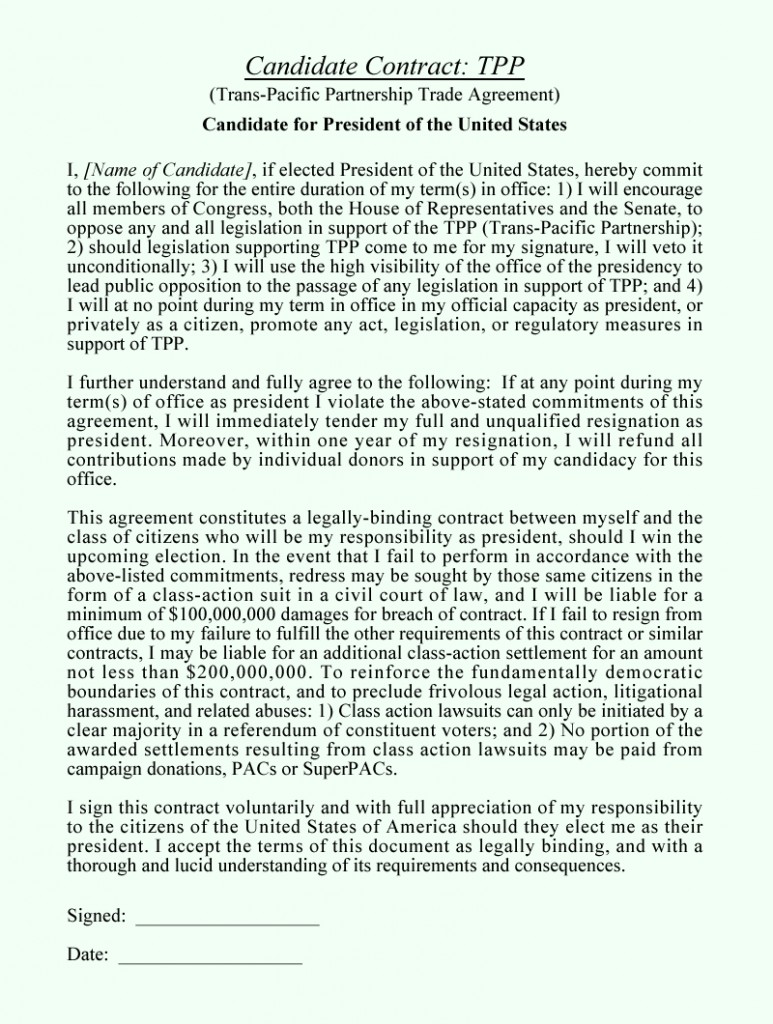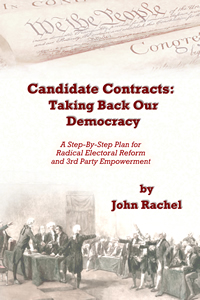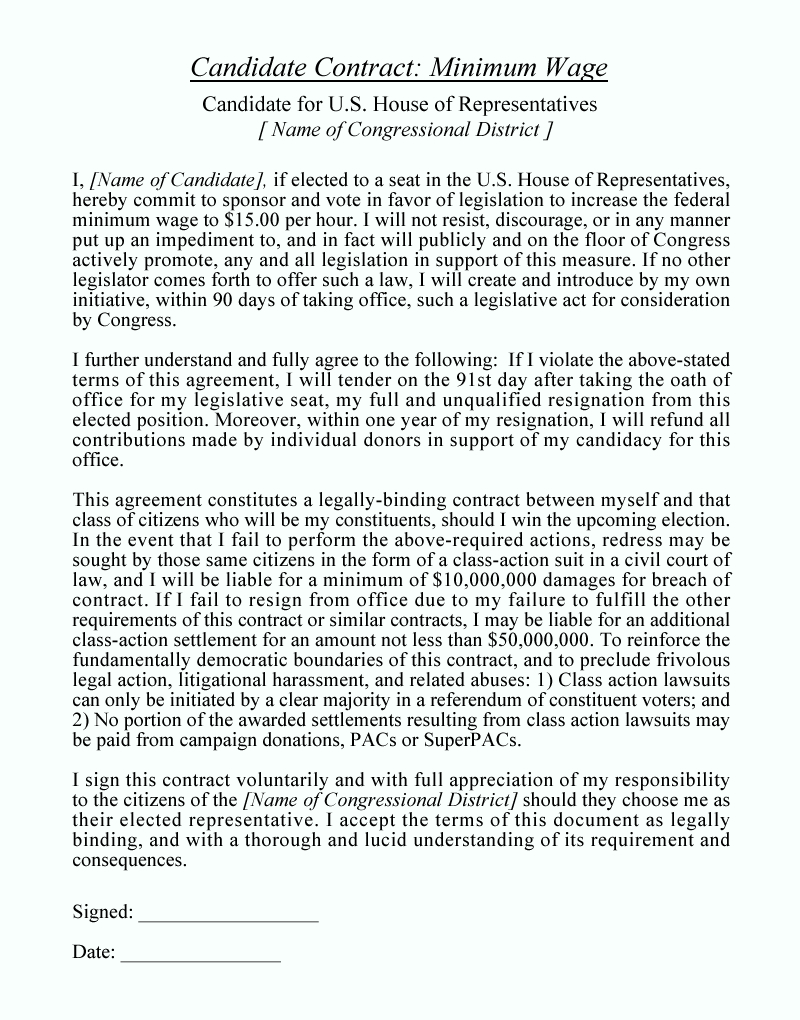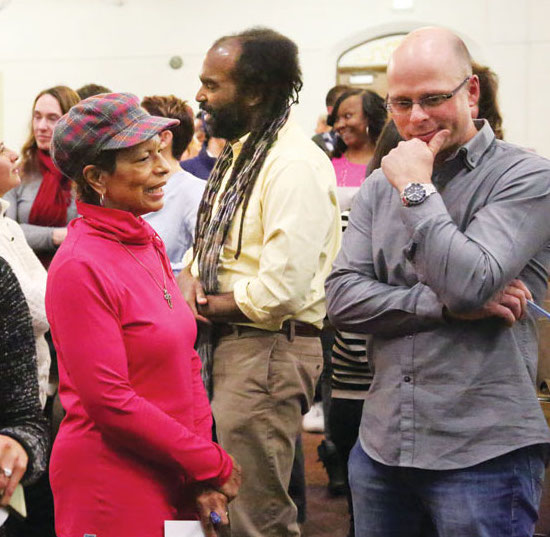 This again builds on preceding articles, which outline my approach to community-based “regime change” activism. I recommend you read them first to fully appreciate what now follows here.
This again builds on preceding articles, which outline my approach to community-based “regime change” activism. I recommend you read them first to fully appreciate what now follows here.
Part I
Part II
Part III
Part IV
Part V
Part VI
It’s easy to get discouraged — even become cynical — when viewing our current electoral system. The news is highly sensationalized. Much coverage is quite superficial, focusing on human drama, scandal, who’s up who’s down, more resembling reporting of celebrity gossip and sports team rivalry than offering responsible perspectives on political matters.
Of course, the Democrats and Republicans are fine with this, neither truly committed to representing the needs and demands of the voting public. Anything which distracts us from realizing their indifference to the everyday citizen is to their benefit and welcomed. Along the same lines, they stubbornly prevent minor party candidates from participating in debates, guaranteeing the absence of fresh ideas or meaningful controversy. A genuine, thoughtful and rewarding national conversation about the challenges confronting both the country as a whole and us as individual citizens appears impossible in this environment.
But is it?
The whole point of this series of Putting Boots (Birkenstocks) on the Ground articles is that it is possible! But for it to happen we must rely on ourselves. The corporate media and our government are not going to lead this effort. In fact, those now in power will do everything to prevent a national conversation of substance from occurring, because it would threaten their privilege and primacy.
Do you think I’m exaggerating?
Just look at the news. Just look at our choices for president.
Clinton? Cruz? Trump? Is this a bad joke or what?
Bernie Sanders offers a powerful vision and coherent plan for change, which is why he gets virtually no press and faces sure annihilation at convention time. John Kasich appears not to be a raving lunatic, which in this election clearly disqualifies him from consideration.
Let’s face it: To come up with a more extreme version of reality, we’d have to resort to reading Franz Kafka novels or watching Andy Warhol movies.
So with nothing better to do than shake my head at the absurdity of it all, I am with no irony or secret agenda trying to salvage something constructive out of this election ordeal. And I start by ignoring the entire presidential three-ring circus and focusing on the only political sphere which by any sensible analysis can make a difference come November.
There is no law — not yet anyway — against any of what I’ve proposed thus far.
We gauge community support and solicit voter endorsement on hot-button issues with citizen petition/pledges. This is grass-roots democracy in action.
Based on the (hopefully) substantial number of petition/pledges gathered, we formulate candidate contracts. All candidates running locally for a particular office are offered the opportunity to sign them. If possible, extending this offer should occur in a highly public forum — a campaign rally, a town hall meeting, any public event or personal appearance where there are people and reporters.
Because the contracts are so demanding and the associated penalties so severe for breach of their terms, we should expect the mainstream candidates to reject them outright.
A candidate who does sign them — only expect there to be one, probably one identified beforehand by the citizens group which formulated the candidate contracts — should get enormous praise. He or she deserves love and support, accolades and plaudits, and most of all deserves to get elected.
The candidates who do not — this will often include the incumbent — should be called out, demonized, vilified. Voters should be clear in their minds about what the contracts mean. A candidate who signs is on the side of the voters. Candidates who don’t are working for the rich and powerful.
Sign contract = good! Don’t sign contract = bad!
Yes, I’m serious. This is not being simpleminded. This is just being straightforward.
After all, the contracts equate to a commitment to represent the needs and desires of the voting public. That’s good! That’s exactly what we’re trying to accomplish. Democracy of the people, by the people, for the people.
Correspondingly, a failure to embrace and sign the contracts calls into question both the integrity and commitment of a candidate. I’d say that’s pretty damning, wouldn’t you?
Every opportunity to draw public attention to the contracts — who is on board and who is not, keeping a keen eye for press coverage — should be exploited to fullest advantage and potential for mass exposure.
This is the main thrust of the contract strategy! It is not a piece of legalese to be stuffed in a file folder. It’s a PR device which should be front-and-center in a campaign. The contract embodies a powerful message. The candidate who signs it has integrity, transparency, is willing to put his constituents first, intends to go to Washington DC to do the job the voters elected him or her to do.
Bear in mind that the candidate who signs the contract probably will be independent or minor-party, or running on the short end of the stick against a powerhouse incumbent. Thus he or she will not have much money. The only way to get around this obstacle is generating free publicity. Free publicity is obtained by creating news-worthy events.
I believe that if the candidate contracts are wielded properly — not as some polite legal document but as a weapon of mass media engagement — it will not be all that difficult to get them and the candidate who signs them all over the news. It’s just a matter of setting the stage and getting the lighting right.
Let me offer a couple examples. These may at first seem a bit extreme, but as far as I’m concerned, in the service of real democracy and honest representation, there’s no such thing as ‘too outrageous’. Having said that, please understand that I’m not advocating dishonesty or mean-spiritedness. There’s a lot of room for creativity here, without embracing the dark side.
Example #1 . . .
We have an incumbent that won’t sign a contract protecting Social Security. We have an independent or minor party candidate who has signed it. So we line up ten or twenty very old people in wheel chairs and block traffic on a major street. They hold signs that say: “Why won’t Congressman [ name of incumbent ] sign the contract? I need my Social Security to survive!” The candidate who did sign it circulates among them holding up the signed contract in one hand, and a poster in the other that says: “I’m Michael Marvellous. These elderly people deserve our support. I SIGNED THE CONTRACT!”
Of course, the media was given advance notice for this staged event. Even if they send second stringers, they’ll still get it all on video.
Now what’s going to happen? Are the police going to pepper spray grandma? Well, now that I think about it, they might. (Sorry about that, grandma.) But this is perfect! I can see the headlines now . . .
Sweet Old Lady in Wheelchair Pepper Sprayed at Protest
Over Incumbent’s Refusal to Support Social Security
How does the expression go? . . . You can’t buy publicity like that!
As if you hadn’t surmised, I am all for street theater, massive protests, civil disobedience, getting arrested, whatever it takes barring violence to get the public to focus on important issues. What makes no sense to me is when such displays don’t produce the potential for concrete action. Going on right now as I write this piece is a very admirable effort to make the public aware of how thoroughly our democracy has been corrupted and destroyed by big money in politics. Sadly, Democracy Spring has gotten very limited media exposure, though its agenda and intent are truly laudable. So far their biggest claim to notoriety seems to be how many people have been arrested, a new Guinness Book world record! Other than that, it offers no actionable agenda, no specific legislation, no constitutional amendment, nothing voters can rally around and vote for, other than a vague demand that America needs a new Congress which will listen to the people.
My example draws attention to a specific choice: Vote for a buttplug who, notwithstanding a lot of wonderful sounding campaign rhetoric, doesn’t give one whit about retirees caught in a web of poverty, or vote for a candidate who has signed a legal contract that guarantees he or she will fight to keep Social Security viable, solvent, and sufficient to meet the needs of the elderly who depend on it for a decent life in their golden years.
Voters are given something they can act on. Vote for a black hat or a white hat.
Let me give one more example, even more dramatic than the last, of how the candidate contract can be used to draw in the media, always hungry for news that “bleeds”.
Major party candidate A refuses to sign a contract to end all the wars in the Middle East. Candidate B, who has signed the contract, goes to a VA hospital with a talking head from the local television station. Several patients are wearing ‘Candidate B signed the contract!’ t-shirts. One of them holds up a sign . . .
If Congress had brought the troops
back home, I’d still have my legs.
The talking head interviews some of the maimed and crippled vets. Candidate B talks about how “supporting our troops” means not fighting wars we don’t have to fight, going on to explain how most Americans want the wars to end. He declares his unequivocal support for ending the wars in the Middle East and waves the contract as proof.
Is this manipulative, exploitative? It’s not as manipulative and exploitative as our leaders lying and leading the country into conflicts it doesn’t have to fight. It’s not as manipulative as saying one thing when campaigning just to curry favor with potential voters, then going to Washington DC and doing the bidding of lobbyists and fat-cat campaign donors. And it’s certainly not as exploitative as having our soldiers in the bloom of their youth give their lives for corporate profits or in pursuit of delusional fantasies of world empire.
Sometimes we have to fight fire with fire.
And always, we have to fight lies with the truth.
Maybe it makes you uncomfortable thinking about grandma getting pepper sprayed or looking at young men with stumps where healthy legs used to be and puckering sockets where they once had eyes. But personally it makes me really uncomfortable thinking about grandma starving to death in her apartment or dying because she couldn’t afford some prescription medication, or seeing these these young men mangled in battles which never should have been fought in countries we never should have invaded, all while inside the DC bubble congressman are having $200 lunches with lobbyists from Wall Street and CEOs for the defense contractors.
My point is simple. If we want to change the way politicians get elected, we need to make choices stark, obvious. No ambiguities. No equivocation. No obfuscation. No excuses.
Getting the truth out to the voting public on exactly where the candidates stand requires audacity, creativity, courage, some outside-the-box thinking. But it can be done. It should be done. It must be done! Voters don’t need to see protest signs. They need to see honest and clear choices at the polls. The contracts leave no room for error or misinterpretation.
“Hmm. That fellow signed a legally-binding contract. If I vote for him, I know I’ll get some service, not a bunch of broken campaign promises.”
On the flip side — that is, in terms of the candidate who refuses or can’t sign the contract, — we can’t show any mercy. None! This individual is showing his or her true colors and should be stigmatized, ostracized, and condemned at every opportunity. Picket campaign offices, demonstrate at rallies and all public appearances. Get manhandled and arrested. Get in the news! This is free publicity. But it’s news the public should be getting.
Is it negative campaigning? Let’s see. This candidate is making a public refusal to sign a contract that commits the candidate to serving the needs and desires of his constituents. It’s a refusal to represent the very people who elected him! Why shouldn’t that be public knowledge? Before they cast their ballots, people need to ask themselves things like . . .
Why won’t the Republican guy sign the contract to raise the
minimum wage? Can’t his rich friends pay a living wage?
Why won’t the Democrat for Congress sign the contract for
free college tuition? Isn’t education important to her?
Why won’t my congressman sign the contract on GMO
labeling? How do I know what I’m feeding my kids?
Why won’t my congressman sign the contract ending
Citizens United? Whose side is he on anyway?
I know of no other way go about this, besides magically coming up with an enormous pile of money to take on the enormous piles of money these bought-and-paid for politicians have in their coffers — legal bribes to charm and woo voters, often to deceive them.
Either we play tough or we lose. Then all we’re left with is wiling away the time until the next election rolls around, pining about what we could and should have done.
Politics is not a polite game of ping pong. It’s a gladiator sport. Either come ready to do battle or slink back to your slave quarters and sip on the brine they’re telling you is soup. At night you can lay on your moldy cot thinking of ways to apologize to your children for not having acted boldly and decisively when the duties of citizenship required it.
I offer no apologies for being so blunt. We are losing our democracy.
We are losing the America we all believe in.
We need to come together!
We need to act now!
 Because of some trademark or product protectionist agreement or with Bayer, there is no such thing as generic aspirin here in Japan.
Because of some trademark or product protectionist agreement or with Bayer, there is no such thing as generic aspirin here in Japan.























ASD: A Pandemic for an Empire in Decline
It’s important to label everything, as if giving something a name somehow establishes control over it, mastery. If it’s a disease, just being able to say, “It’s obvious that this person suffers from catalomistic phrenapsidia,” puts us well on the road to a cure.
An acronym is even better! Three or four letters does the trick. Knowing that 10.2% of our children are ADHD, coupled with the understanding that we can douse them with all sorts of miracle drugs — prescription meth — puts us all at ease. Situation under control!
I’ve come up with both a new pathology and a self-generated acronym that sums up what seems to afflict our political leadership — or lack of leadership might be more accurate.
ASD!
Doesn’t it just roll off your tongue?
While phonetically it’s a cousin of LSD, and you could certainly speculate about possible fanciful connections, LSD is just short for its chemical name — lysergic acid diethylamide. ASD tends to be more descriptive and incisive, comprehensive, and indeed incriminating. It says just about all that needs to be said about behavior that seems counter-productive, anti-social, self-serving, self-obsessed, even ultimately self-destructive, manifestly driven by values most of us don’t understand, much less share.
ASD stands for Advanced Sociopathic Disorder.
What are the symptoms of sociopathy?
They never recognize the rights of others and see their self-serving behaviors as permissible. They appear to be charming, yet are covertly hostile and domineering, seeing their victim as merely an instrument to be used. They may dominate and humiliate their victims.
Feels entitled to certain things as “their right.”
Has no problem lying coolly and easily and it is almost impossible for them to be truthful on a consistent basis. Can create, and get caught up in, a complex belief about their own powers and abilities. Extremely convincing and even able to pass lie detector tests.
A deep seated rage, which is split off and repressed, is at their core. Does not see others around them as people, but only as targets and opportunities. Instead of friends, they have victims and accomplices who end up as victims. The end always justifies the means and they let nothing stand in their way.
When they show what seems to be warmth, joy, love and compassion it is more feigned than experienced and serves an ulterior motive. Outraged by insignificant matters, yet remaining unmoved and cold by what would upset a normal person. Since they are not genuine, neither are their promises.
Living on the edge. Verbal outbursts and physical punishments are normal. Promiscuity and gambling are common.
Unable to empathize with the pain of their victims, having only contempt for others’ feelings of distress and readily taking advantage of them.
Rage and abuse, alternating with small expressions of love and approval produce an addictive cycle for abuser and abused, as well as creating hopelessness in the victim. Believe they are all-powerful, all-knowing, entitled to every wish, no sense of personal boundaries, no concern for their impact on others.
Not concerned about wrecking others’ lives and dreams. Oblivious or indifferent to the devastation they cause. Does not accept blame themselves, but blames others, even for acts they obviously committed.
Promiscuity, child sexual abuse, rape and sexual acting out of all sorts.
Tends to move around a lot or makes all encompassing promises for the future, poor work ethic but exploits others effectively.
Given this characterization, maybe I’m being unfair in exclusively singling out our leaders. Perhaps it’s an affliction that is spreading virally down through much of our society.
Certainly there are good, decent, caring, kind, compassionate people all around. Yet we tolerate, even celebrate, egomania and narcissism like it’s a national religion. A sign of the times? Or a symptom of societal malaise, massive disillusion, and a spiritual vacuum. Is there no public path to self-aggrandizement and extravagance which isn’t acceptable now? Can we make it through a day without taking a selfie?
They say desperate times call for desperate measures.
Maybe desperate times create desperate people.
And desperate people? What is their future?
If they were only dangerous to themselves, that would be one thing.
But . . .
(And now we turn our attention back to our leaders.)
When we see the recklessness of the sociopaths running things these days, we need to seriously ask ourselves.
Who is to stop them?
If they aren’t listening to others . . .
. . . and there’s no voice of conscience on the inside . . .
Then what will stop them from destroying everything?
Because there’s no denying . . .
It would be a truly AWESOME SELFIE!
#POTD